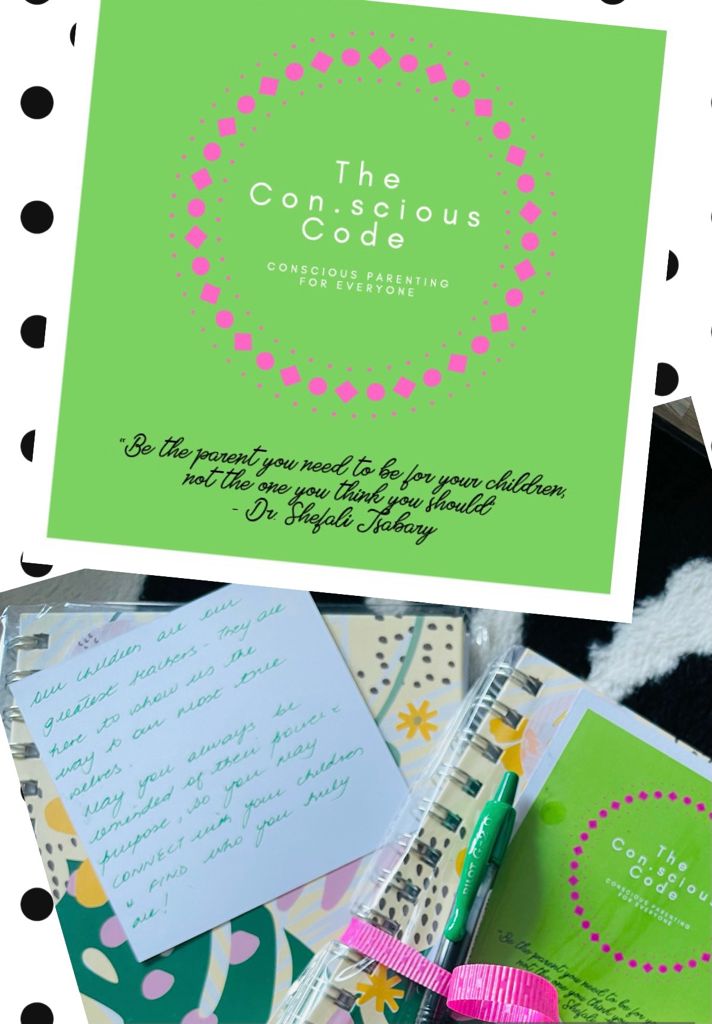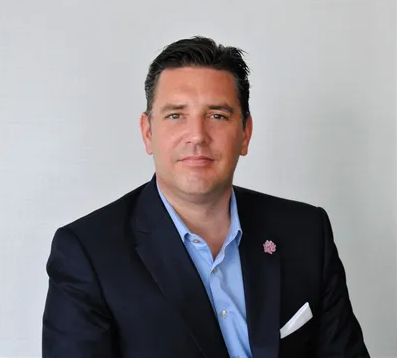Chief Executive Officer, The Conscious Code
Interview by : Zu Anjalika Kamis Gunnulfsen
Tell us all we need to know about Dr Tanushka Mansukhani Melwani.
Well, I am a true multi-hyphenate and my co-ordinates go as doctor-hospital administrator-conscious parenting coach-writer-investor-mom of two…. And while I have certifications for almost all of them, the most important hat I wear (and for which I don’t have a certification) is the mommy!
Currently based out of KL and a happily trailing spouse.
I have studied and certified under Dr. Shefali Tsabary as a Conscious Parenting Coach Practitioner (Conscious Parenting Coaching Program Methodology) and graduated from the University of Bombay (Bachelor of Dentistry) followed by a Masters degree( MBA-Health) at the University of Ateneo De Manila.
How did you get into working with kids and families?
While navigating motherhood, my tween and teen-led me to take a deep dive into studying Respectful Parenting (Childhood Matters with credits in Play Therapy International) and several other programs and finally a certification in her Conscious Parenting Methodology directly under Dr. Shefali Tsabary. I learned to turn the traditional parenting paradigms on their head and look and find the answers within and raise myself first, towards a transformation like none other. It has been nothing short of revolutionary.
Having experienced first-hand the benefits of a deep connection with myself, my children and in turn all my relationships… yes, I grew myself up!
I am now passionate to help and supporting parents in their journey to honouring themselves and liberating their children through my one-on-one coaching and flagship workshops using the principles and methodology of conscious parenting.
What are some of the common problems kids face these days?
While there is a multitude of problems faced by the current generation, based on the many parents I have worked with, I can say that anxiety (social and academic), disconnection and poor communication would be my top 3. In the world they live in, with more academic pressure than ever before, a highly competitive environment fueled by culture/society’s expectations, over scheduling, lack of sleep, technology, social media and then add COVID to the mix!..it’s a perfect storm.
Are parents getting more sophisticated and skilled when it comes to child-rearing in this current time, Dr?
When we were being raised, I would describe the parenting to be what I call neglectful, which ranged from being benignly neglectful to actual neglect. However, parents, these days have moved to the polar end of that continuum and have become “hypervigilant”. Children nowadays are on the proverbial petri dish and are being examined closely to the detriment of their authenticity. Parents have bought into what I call PIC (Parenting Industrial complex) and the ‘sport’ of schooling, where the ‘product’ is the child and the bragging rights belong to the parents! Children cannot simply ‘be’, they must constantly ‘do’, just to feel worthy- leading to a disconnect with themselves and in turn others.
Yes, while the parents constantly want to learn more about raising their children in the current times, most methods are just cleverly marketed to disguise traditional ways of parenting which eventually are punitive, shame and fear-based.
Most often than not, we hear about negative trends with kids these days. Are there any positive ones?
With “breaking news”, negative trends and being fed on a diet of ‘fear’…. the media thrives on reporting it. The more fear that can be thrown at parents the more likely businesses such as the pharma industry, schools, universities, therapists, psychologists benefit.
In our extremely busy lives, we are constantly on the go – doing, doing and doing. We parents live in the future or the past and as our anxiety spills over to our children who absorb it non verbally, for they live in the present moment. This clash of time-zones sets up a downward spiral leading to disconnection. However, there is a lot to be ‘positive” about, only if we stop to see and attune and connect with our children. If we can just understand and follow our children’s lead..and unhook from fear. Putting fear in the driver’s seat can only take us to destinations we don’t want to go to!
When it comes to trends- kids these days are extremely conscious of the planet we live in and what they will inherit if some radical changes are not implemented right away. Believing in sustainability at the core of everything, a positive trend I have seen in our next-gen is minimalism, conscious consumption and advocating for climate change.
Also accepting that technology is here to stay and focus on the positives it brings in our lives.
I advocate the 5:1 rule.
Look for 5 positive traits for every negative one that you see in your child and become a ‘media mentor’ rather than an ‘internet cop’ to our kids!
Dr, most times, well-meaning parents unknowingly instil the wrong traits in kids. How can these be avoided?
We parents haven’t understood that parenting isn’t about the child, rather it is about the parent! With culture and society supporting that belief of ‘ownership’ of the child and the parental martyr’s halo on our head -all bets are off. In the name of ‘unconditional love’- we unleash on them our unmet emotional needs. They then have to somehow fill up the ‘holes’ to make us feel ‘whole’!…and if that doesn’t happen.. we have carte blanche to do what we will since we believe we ‘own’ them. However, this is hardly unconditional love but rather transactional. We parents take on the role of a ‘warden’ where we can dish out punishment or rewards to our ‘prisoners’ depending on how we see fit and when they reach the pivotal teenage years and ‘disrespect’ us we become the ‘victims’ without realizing our part that contributed to the dynamics. Owning our co-creation..for example, we are wishy-washy with our boundaries and then feel betrayed when they are inevitably broken, or we do everything for our kids (really because we just can’t even imagine them failing at it) and then we raise a blamer, we make all the decisions for them including the smallest ones like what they should wear and then wonder why they can’t decide which career path they should choose! We shut down their big feelings (because it’s too painful for us to see and feel) and do not allow them to feel their pain/failure and then wonder why our kids turn to surrogates to numb their feelings.
So what is the price of this dependence? Not feeling your feelings? Understand that we are doing them a great disservice in the name of love rather than preventing them from experiencing pain and failure (which is natural), we have to instil in them the belief that they have the ability and resilience to process, learn and grow from it.
How do parents deal with an uncooperative child?
There are only 2 things a child can do when in conflict – comply or defy and all behaviour lies within that continuum. Much like an iceberg- what you see on the surface are just surface behaviours however, on the underside are a vast array of unmet emotional needs that are driving these behaviours. I encourage parents to not make things personal, unhook from the bait of giving labels and judgements and then get curious to understand what the child needs. The English phrase “acting out”- literally means that the child cannot articulate and hence needs to act it out.
So what do children need? Children need to be understood. They need for us to understand who it is they are and what it is that they need? (what they are communicating) beneath their behaviours (Iceberg analogy).
The 4 questions we can ask to understand the needs are:
1) Is the child needing more connection?
2) Is the child needing more boundaries and limits?
3) Is the child flailing on an organic level (lagging skills) and needs supports and systems to help them developmentally?
4) Is there any trauma-Emotional or physical-that we are unaware of? Any red flags that we need to discover?
REMEMBERING TO CONNECT BEFORE WE CORRECT

I am curious – are certain problems more prevalent when it comes to expat children, having to adjust to life in another country – moving away from family and friends?
“It takes a village to raise a child” is something that I believe in, in an ideal world. Living in your home country with extended family has its advantages. However, expat children do become “third culture kids” along the way. They learn to trade in ‘stability’ for a more dynamic, ever-changing and adaptable way of life- traits that are extremely valuable and will hold them in good stead in an ever-changing world. While they may leave behind or be left behind by the constant movement, it also brings with it the gift of a larger perspective and worldview- and yes they almost always have friends(for life) in every part of the world!
How do you know if your child has a behavioural problem or if they are just going through a difficult phase?
If there is one thing I want parents to know is that their children’s BEHAVIOURS MAYBE “BAD”-But their NEEDS NEVER ARE! So my advice to parents is to always REMEMBER: WHEN YOU FEEL FRUSTRATED DUE TO YOUR KIDS BEHAVIOR, REMEMBER THE PHRASE :
“HE/SHE IS NOT GIVING ME A HARD TIME, HE/SHE IS HAVING A HARD TIME” .
It is diving deep to understand the surface behaviour and finding the unmet emotional need. Parenting challenges can be a great opportunity for growth and connection with our kids.
Say “yes” to the feelings but “no” to the behaviour. We as children always had our big feelings shut down, especially the negative ones- like anger, sadness, frustration-and that’s why we can’t bear to see it in our children. If we can allow our children to sit with their feelings and feel them- it’s just akin to a wave that will rise and crash.. however, when we don’t allow it to be felt.. it will be released inappropriately or perhaps even internalized.
Embodying the behaviour will allow your children to learn that all feelings are welcome but we always have a choice on how we can process and release it.. aka react to it. As an example, you can say “ It is ok to feel angry, but it is not ok to slam the door. Perhaps you could punch a boxing bag.”.. remember always to first ‘connect’ with their right (emotional) brain and only then attempt to ‘redirect’ with their left (logical) brain.
However, do watch out for red-flag behaviours and seek professional help.
How can you be reached, Dr?
I have two flagship 3-Day workshops:
- Managing Conflict, Communication and Connection with your Tween/Teen
- Getting a Grip on your Tween/Teens Technology
Please find the link to my bio, preview and reviews for my workshops!
You can reach me: Instagram
E mail: [email protected]
Whats app: +60127902010
Club House: @tanushkam – I am holding a weekly club with Seattle-based Priya Chawathe, who is an Emotional Resilience and Mood Nutrition Coach at 9 am KL/Sing time on different topics related to Conscious Parenting and the Self.






